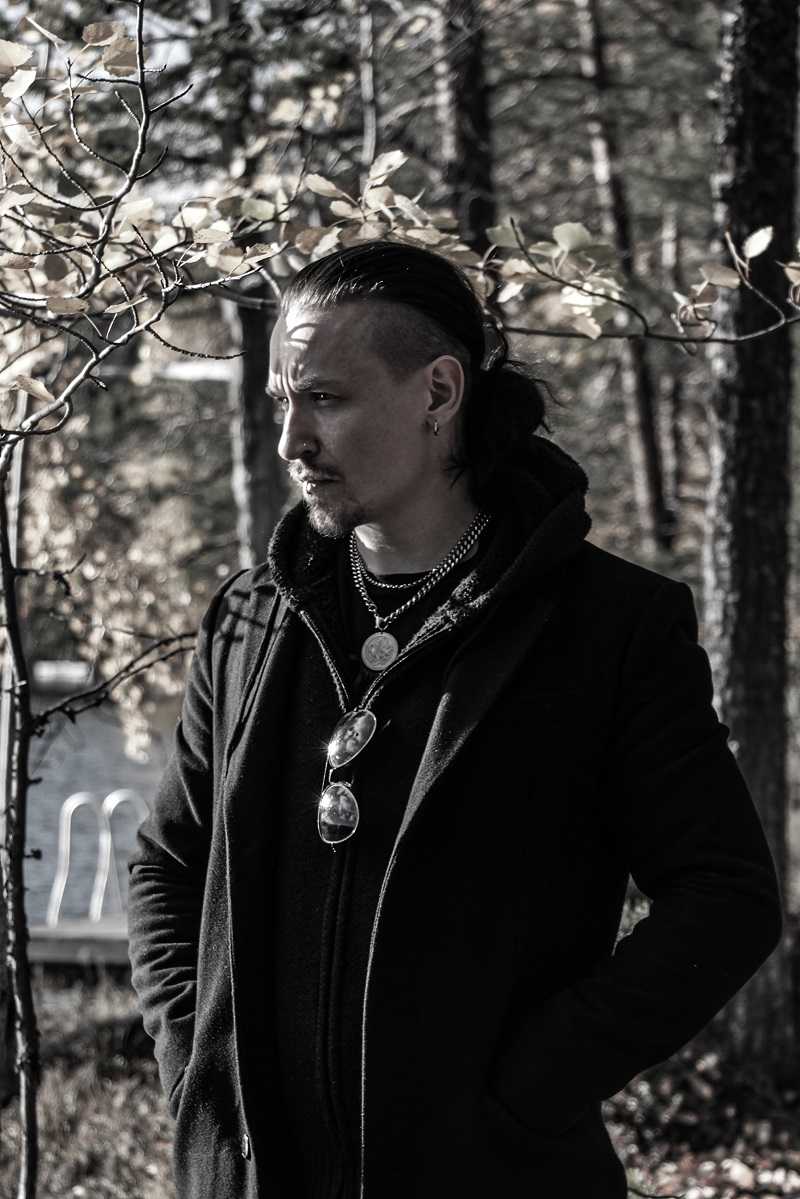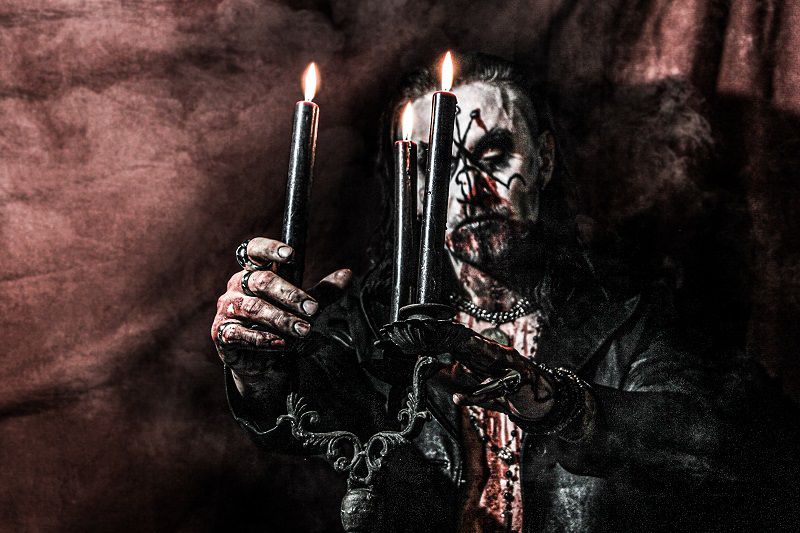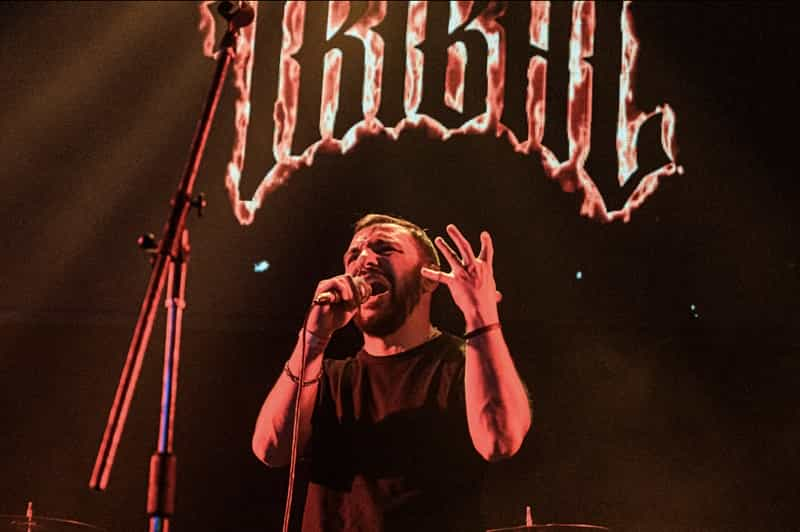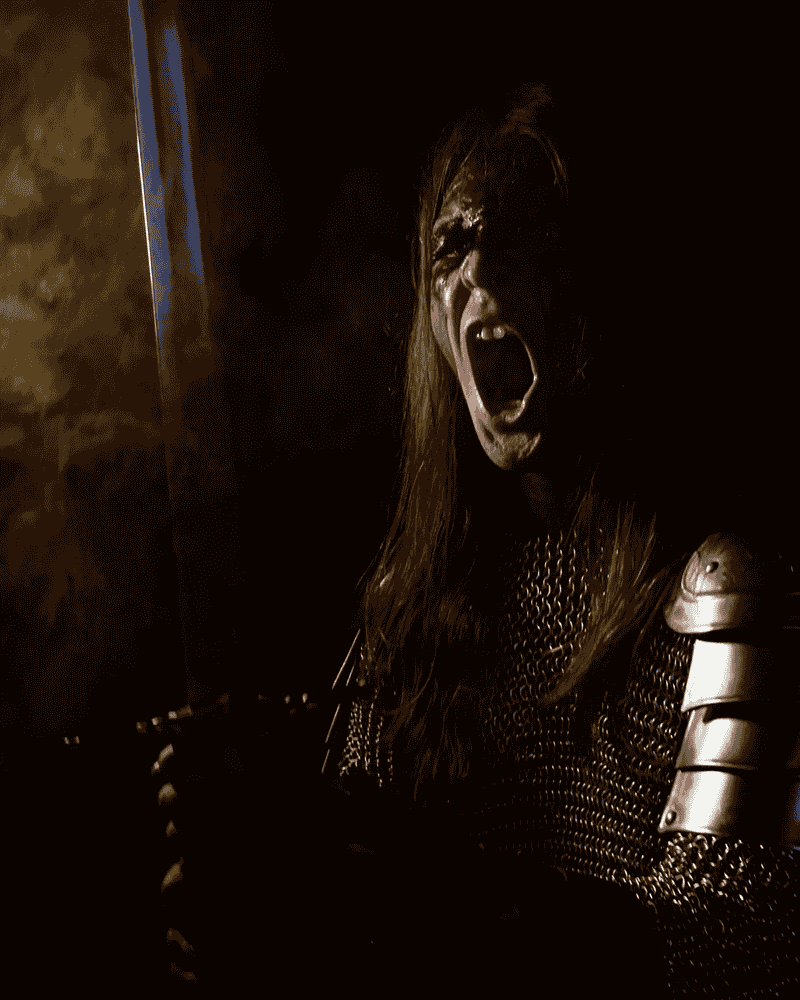Ari Pitkanen – Interview

For any soul who has been keeping up with the black metal underground, the name “Curse Upon a Prayer” certainly rings a bell. Their latest effort, “The Worship: Ortoprax Satanism” in particular seems to have made its way in the minds of fans as a fiery whirlwind of powerful music. The vocalist and mastermind behind the band, Ari XIII, was kind enough to answer a couple of questions on everything from the band’s current situation, to the arts, and much more.
Hello, Ari, and thank you for taking the time to do this interview. It seems there have been plenty of things going on at the moment with the release of “The Worship: Ortoprax Satanism” this summer, and the live shows that came in support of it. What has been the response to the album so far?
It’s been nothing but overwhelming.
This summer you played several shows with Curse Upon a Prayer in Finland, along with one at Under the Black Sun in Germany with Wolves of Perdition. Curse Upon a Prayer is also going to make an appearance at Steelfest 2025. How have these shows gone, and what are your plans for the future regarding concerts and festivals? Any chances of a European tour?
The shows have been nothing but overwhelming as well! With Curse, I do feel we’re just now getting the respect we truly deserve. And it’s been very much evident through out our shows we’ve done. We’re always willing and eager to perform in new territories and there will surely be quite a few of those in the future. Europe included.
Speaking of “The Worship”, one of the aspects that I first noticed about it is how different it is from its predecessor, “Infidel”, particularly in terms of attitude. While “Infidel” is the more straight to the point, “no mercy” kind of record, “The Worship” is much more atmospheric, and has much more developed artistic sensibilities. What inspired this change, and how did it affect the songwriting process?
To me personally, there’s never a certain way to approach songwriting. There might be some acknowledged guidelines in mind but at a certain point the album starts to create itself. And to me, that’s the most interesting part of the whole process. A state of possession, you could say. That’s at least what I’m aiming for; To be merely just a channel for greater things.
“A Heav’n of Hell”, besides being a great song, also reveals some of the elements that inspired the album, most obviously, John Milton’s “Paradise Lost”, with some passages from the book included in the lyrics. How did that come to be? What passages from the book did you find the most meaningful/interesting?
I do have a background in art studies and the works of John Milton have always stuck with me. Especially at a young age. To utilize some of these passages was simply a natural flow – again, not forced by any means. To a certain extent it did indeed inspire some of the themes, the dramatic act of rebellion and the unconquerable will, but at the same time it adorned and underlined the independet impulse that gave birth to the composition and the lyric in the first place. It all aligned beautifully and truly felt like a bliss.
During the video for “A Heav’n of Hell”, the painting “Satan Summoning his Legions” by Thomas Lawrence is featured. Are there any other works of art that influenced, or could be associated with the album? Are there any other painters or writers whose work has inspired you over the years?
Yes, there are several painters and writers who I look up to. But for this song and for this album there was only the one that you mentioned: Satan Summoning His Legions. It was a very central factor and a point of focus during the songwriting process. I do think it is an accurate representation of the spirit of the album and the band itself in this particular period of time.
Alongside Curse Upon a Prayer, you also play in Rietas, with whom you have released the split “Loimus”, along with Riivaus, last year. What does the future hold for Rietas? What about Coraxul and The Parasite Paradise?
For Rietas, I’m working on a full-length album together with our drummer as we speak. New material from Coraxul can be expected suprisingly soon as well.
As for The Parasite Paradise, remains to be seen. C.U.A.P. takes majority of my time at the moment and since I am the only songwriter in this band as well, I don’t have the respectful amount of time needed. I’m fully booked for the time beign.
On a different note, how did you get into metal, and what inspired you to become a musician? What bands and albums do you think impacted your journey the most? Are there any musicians that you particularly look up to?
There was certainly a natural gravitation towards it. I’d say it was more or less built in. Meaning, same kind of patterns were already there even before the music. The music more or less just made everything make sense – for the lack of a better explanation.
I was introduced to more heavier music by my older brother and before that I was already familiar with some more traditional rock ‘n roll music – that still to this day is near and dear to my heart. Music is something that has been running in my family for years, so again, it was simply a natural thing to pursue. I think I would be more or less involved in it even without the Black Metal aspect. Hard to imagine, but still.
Almost impossible to pick specific albums that have made an impact, let alone musicians. Sometimes I tend to get inspired more about the attitude and the spirit of making the music rather than the actual music even. But there are certainly albums that hold great meaning to me personally and artists I would give a well-deserved, firm handshake!

You mentioned in previous interviews that you believe anti-Christianity or anti-Islam are themes too shallow to base a band off of. What is the philosophy on which you base your music? Do the bands you play in share principles?
I tend to be very careful when discussing about this topic. People usually get a bit confused when a spiritual path like ‘Satanism’ is discussed and it is usually as tiresome as it is pointless. And what is important to remember: these things go way beyond the music itself and thus it doesn’t feel quite natural to discuss about them in a music interview. There’s a very specific root that inspires the music, yes – but the music and the art are indeed the only aspects of it I’m comfortable to fully share with the outside world.
What moments in your life do you think have shaped your artistic vision and view of the world the most? Are there any unorthodox sources of inspiration that you have found throughout the years?
Good question. It has to be an equation of everything between personal life and the art that you naturally gravitate towards to. And usually they do affect one another: The music can affect your personal life and vice versa.
Beign introduced to this form of art at an early age surely affected the path that I ended up on – I’d say one of the many turning points was seeing ‘Enochian Crescent’ live at the tender age of 14 in 2010 in Simerock, Rovaniemi. They were quite a notorious live act and surely did the trick to a young teenagers consciousness back in the day. First time seeing some slit human flesh among many other, eroticly violent and vile things. So, I was pretty much fucked from that point on and it was indeed the same year C.U.A.P. was born as well. During the same period of time I was also introduced to ‘Let The Devil In’ by Sargeist and ‘Maranatha’ by Funeral Mist. Which still to this day is the ideal Black Metal for me personally and surely enough, things escalated quite rabidly from that point on. And there surely has been a few unorthodox happenings along the way, which is only natural in this unnatural form of music.
Have you ever pursued other forms of art, besides music? What do you think is the role of art in today’s world?
Yes. The first passion as a child for me was painting actually, even before I started playing music at the age of 10. Apart from that; I’ve been doing photography art and graphic design for years now as well. Latest example would be the latest album.
Difficult to say about the actual meaning. It surely means different things to different people. To me it has been a point of focus through out my existence and it is the majority of what I am as a person. But there are, in all honesty, certain elements attached to it that I absolutely despise.
Ever since its inception, black metal has resonated with numerous people. From your point of view, what do you think makes this kind of music meaningful?
I think majority of the people are purely just fascinated by it, rather than having an actual calling and an authentic gravitation towards it. At its finest Black Metal can be an utter state of trance – which is something alot of people tend to crave after all. A religion, one could say.
Many musicians, as well as fans, have noticed that black metal has a strong spiritual element attached to it. Has this resonated with you?
Yes. But I would argue that strong spiritual element is attached to just certain bands.
Lastly, if you were to choose any symbol to represent your music, what would it be, and why?
My own, personal sigil. And the reason is very clear.
Thank you once again for taking the time to do this interview, I hope you found the questions interesting. Is there anything else you would like to add?
Thank you. It was a pleasure.
Live the life, die the Death!
Interview by Ioana
Coraxul
Facebook
Curse Upon a Prayer
Bandcamp
Deezer
Facebook
Instagram
Spotify
YouTube
Rietas
Bandcamp
The Parasite Paradise
Instagram
Soundcloud
Bandcamp
Facebook
**Please support the underground! It’s vital to the future of our genre.**
#WeAreBlessedAltarZine
#TheZineSupportingTheUnderground


